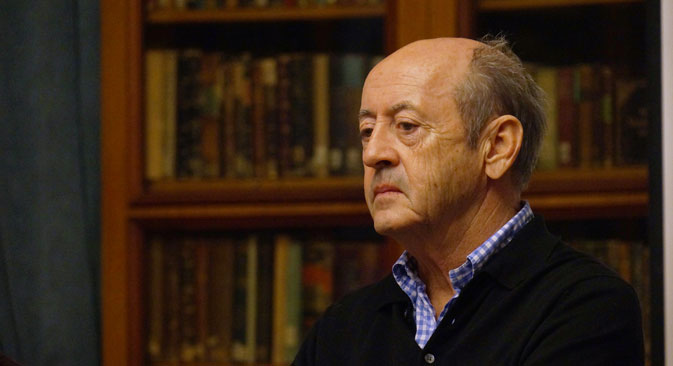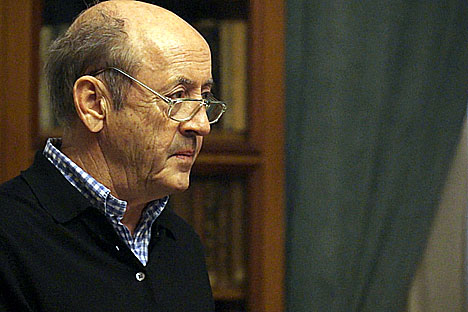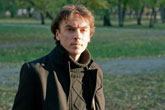Billy Collins in Russia: Can a poet be a diplomat?

Billy Collins: “I think that poetry, probably, vividly shows us what we have in common.” Source: RBTH
In his poem, “Introduction to Poetry,” Billy Collins writes, “I ask them to take a poem, and hold it up to the light like a color slide/or press an ear against its hive.” In the same poem, he writes, “but all they want to do is to tie the poem to a chair with rope and torture a confession out of it.”
Perhaps he is asking readers to suspend quick judgments and instead, listen carefully to something deeper.
It has been three years since a famous statue of American poet Walt Whitman was erected at the Moscow State University campus. And now Billy Collins is presenting in Russia a series of lectures about the importance of poetry for mutual understanding between countries.
Billy Collins, born on March 22, 1941, is an American poet. He was appointed as Poet Laureate of the United States from 2001 to 2003. Collins was recognized as a Literary Lion of the New York Public Library (1992) and selected as the New York State Poet for 2004 through 2006. He is currently a teacher in the MFA program at the University of Stony Brook Southampton. He is the author of the famous 9/11 poem, “The Names”.
The Whitman statue on the Moscow campus is a gift to reciprocate for a statue of Alexander Pushkin. The revered Russian poet and author of “Eugene Onegin” resides immortally on the campus of George Washington University in Washington, D.C.
Likewise, Billy Collins’s visit to Moscow is a vibrant attempt to step up mutual understanding between the countries.
“I was very surprised to see the statue of Walt Whitman [in Moscow],” Collins told Russia Beyond The Headlines. “He is hiding behind the tree there. I was asked to identify him without looking [at the caption]. And I could identify him – yes, it looks like Walt Whitman.”
The caption to the Whitman statue reads: “You Russians, and we, Americans!... so far apart from each other, so seemingly different and yet... in ways that are most important, our countries are so alike...”
Collins agrees with his predecessor but wanted to broaden Whitman’s comments.
“The people of many different countries have similar feelings and aspirations,” he said. “I think that poetry, probably, ... vividly and clearly shows us what we have in common. I think if you read the poetry of America, or Russia, or Persia, or Greece you’ll find the same human concerns are voiced in [all of] our poems.”
View the VIDEO by RBTH: Poet Billy Collins on poetry bringing nations together.
Collins has already taken the floor at Moscow State University’s Department of Philology, Oval Hall of the State Library for Foreign Literature and Maxim Gorky Literature Institute. Tomorrow, he will speak and read his poems at the American Center in Moscow.
Literature as public diplomacy
According to Collins, Russian poetry has become much more popular in the United States over the last 20 to 30 years. Americans most fervently read Joseph Brodsky, Anna Akhmatova and Marina Tsvetaeva, he said.
“So many people read a lot of books these days to look at influences outside of America, particularly,” Collins explains. “We are all looking for models.”
When asked if the poetry can work as public diplomacy, he said that it is “a very hopeful idea.”
“In some utopian vision I could imagine people from different countries at conference tables to read poems. That’s not going to happen,” he said, adding that public diplomacy is hardly likely to measure the true value and the social good of art and literature.
“You can only measure it personally,” he explained. “It’s what reading literature does to your interior. Each of us has one, very limited life and it probably expands that life with various possibilities. The broad social good that literature does is not something that you can quantify or measure.”
Peter T. Eckstrom, assistant cultural affairs officer at the U.S. Embassy in Moscow, looks at literature a bit differently. He believes that poetry can “create mutual understanding between peoples.”
“It’s not traditional diplomacy,” he said. “It’s more reaching out to people and explaining one’s own culture to others. Russian literature can help me understand better about Russia. Likewise, bringing poets and other creative people like Billy Collins can help Russian people better understand the United States.”
Peggy Owen, speech pathologist at the Anglo-American School in Moscow, agrees with Eckstrom.
“Poetry is a very good avenue for public diplomacy because poetry is more honest than prose,” she said. “People say things in poetry that they would not dare to say in prose because you can disguise a little and tell the truth a little.”
All rights reserved by Rossiyskaya Gazeta.
Subscribe
to our newsletter!
Get the week's best stories straight to your inbox

